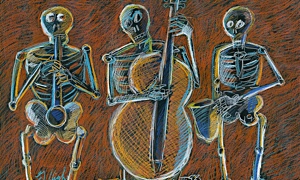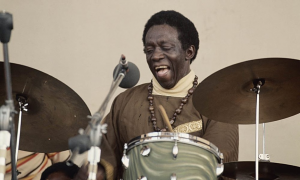Home » Jazz Articles » What is Jazz? » Worth the Wait!
Worth the Wait!
Some of the genre's most historically significant performances did not surface on record until the new millennium.
Some of the genre's most historically significant performances did not surface on record until the new millennium. The first release of Miles Davis' Bootleg Series, from a run of shows in Europe in the fall of 1967, did not see the light of day until September 20, 2011. The second in that series was from a 1969 European tour, released in 2013, and the next pulled from 1970 performances, released in 2014. In addition, Davis's 1951 performance on Birdland (Blue Note), didn't have an official master release until 2004.
Also on Blue Note is Thelonious Monk and John Coltrane's live performance, At Carnegie Hall, recorded on November 29, 1957. It didn't hit record store shelves until September 27, 2005, after the tapes were discovered at the Library of Congress. Billie Holiday and Ray Charles were just a couple of the other names on the bill for this historical benefit concert. This particular release seems to be endlessly hailed by critics and fans alike.
Despite years of some of the greatest live recordings being neglected, who can complain? A great mastered release is always worth the wait! It is as if some of these recordings made their own decision when to be released to the world, when the fruit was just ripe for picking. Thelonious Monk fans lucked out and only had to wait 17 years for Live at the It Club, recorded in 1964, with Columbia records deciding to release it in 1982. Billie Holiday's epic live recording at Carnegie Hall in 1956. only took 6 years to be released by Verve in 1962, just three years after the singer's passing.
Whether the wait is short or long, it seems like it's always meant to be. It seemed necessary to let some of these live cuts marinade on the shelf for a while. It is more probable that most of these types of long-awaited releases are more of a marketing strategy than anything else, but it is still nice to fantasize. One can only wonder what performances of today (if any) will be cherished in the far future in the same way, or if at all?
Tags
Comments
PREVIOUS / NEXT
Support All About Jazz
 All About Jazz has been a pillar of jazz since 1995, championing it as an art form and, more importantly, supporting the musicians who make it. Our enduring commitment has made "AAJ" one of the most culturally important websites of its kind, read by hundreds of thousands of fans, musicians and industry figures every month.
All About Jazz has been a pillar of jazz since 1995, championing it as an art form and, more importantly, supporting the musicians who make it. Our enduring commitment has made "AAJ" one of the most culturally important websites of its kind, read by hundreds of thousands of fans, musicians and industry figures every month.






























